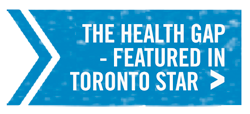
From research to treatment options to access to services and programs, many women are overlooked and underserved because healthcare has traditionally not considered the impact of sex and gender differences.
Research shows that women’s needs, including physiological differences, cultural challenges and life circumstances, are often not taken into consideration. This is the Health Gap. And for women in marginalized and disadvantaged communities, this gap is even wider.


Women are often overlooked when it comes to health research studies, yet they have different risk factors for certain diseases, and may also respond differently to various treatments and medications.
Did you know:
It’s time to close these Health Gaps.


Women are more likely than men to suffer from multiple, co-occuring, chronic conditions such as chronic pain, heart disease and diabetes.
Did you know:
These are Health Gaps.


Women suffer from mental health conditions such as depression, anxiety and trauma significantly more than men, yet face more barriers to accessing healthcare services.
Did you know:
These are Health Gaps.


Social determinants of health, including factors like income, employment status and housing, all influence a person’s risk for disease or injury and women are even more vulnerable to these affects.
Did you know:
These are Health Gaps.


Women’s College Hospital is working to close the Health Gap through groundbreaking research, innovative models of care, education and specialized programs and services. With a vision and mission to advance and advocate for the health of women and improve healthcare options for all, WCH is working to close the Health Gap in a number of ways:


Women's College Research Institute is the only Research Institute in Canada with a focus on women's health. Our researchers and scientists conduct research that improves the health of women, helps people prevent and manage complex chronic conditions that have unique implications for women throughout their lives such as depression, HIV, sexual assault and domestic violence, diabetes, and heart disease , and delivers tangible solutions for the most pressing issues facing our health system. Additionally, they are exploring the social, political and economic forces that influence women's health and their access to health care, and are looking to reinvent health care for women and their families using a gender sensitive approach through programs such as the Women’s Xchange.


Women’s College Hospital has the largest women’s mental health program in Canada: the interdisciplinary Women's Mental Health Program. This program provides innovative, women-centered mental health treatment, education and research exploring the biological and social factors that shape women's mental health. The program is designed around issues that are specific to women - depression and anxiety associated with menstruation, pregnancy, childbirth and menopause; psychiatric and psychological issues that result from experiencing abuse and violence; and mental health issues associated with medical conditions such as diabetes or heart disease.


Some of the biggest barriers women face in accessing the care they need are their daily obligations and family responsibilities. So as Canada’s leading academic ambulatory hospital, WCH has developed models of ambulatory care that can deliver comprehensive programs with less disruption to patients’ lives. This includes services ranging from diagnostic investigations and therapeutic treatments to complex surgeries that can all be done without hospital admission and over-night stays. It’s an innovative one-stop-shop approach with various health professionals being co-located in one area so they can deliver highly coordinated care. It also includes a model of ambulatory surgery that avoids the need for overnight stays, with better treatment outcomes and higher patient satisfaction and a reduced risk of getting hospital acquired infections.


The Women’s Cardiovascular Health Initiative is Canada’s first comprehensive assessment and lifestyle program for women with existing or potential heart problems. This program is also home to the first and only evidence-based cardiac rehabilitation program in Canada specifically for women. The WCH program has high adherence rates of 85 per cent, compared to other cardiac rehab programs that report adherence rates of less than 50 per cent.


Women face various challenges and barriers accessing healthcare for themselves and/or their families, and Women’s College Hospital (WCH) has implemented a number of partnerships and programs to help make things easier. These include:


Women’s Health Matters is the only website dedicated to women’s health with free, evidence-based information from the women’s health experts and clinicians at Women’s College Hospital (WCH). It provides health literacy for women:


The incidence of sexual assault and violence against women is increasing. One in four women in North America will be sexually assaulted in their lifetime, yet many women do not report their assault to police because of stigmatization, financial dependence on their assailant or risks to their own and their childrens’ safety. Through it’s Sexual Assault and Domestic Violence Care Centre (SA/DVCC) Women’s College is delivering education and building awareness of this growing problem and working with government partners to introduce policies that will help stop the cycle of violence. And the SA/DVCC is available 24 hours a day, seven days a week and is a comprehensive service for victims of violence.


Most addiction treatment takes place in institutions that are far away from healthcare centres, have long waiting lists and primarily use psychosocial counselling. This means that when patients are in crisis often the only place they can turn to is their nearest emergency department, which doesn’t lead to optimal, long term treatment results. So WCH developed the Substance Use Network (SUN), a program that improves access and views addiction as both a biomedical and psychological illness. This unique service uses completely different models of care with an inter-professional team combining addictions services, family medicine, psychiatry and social work. It also offers an ambulatory detox program which allows patients to avoid hospital admission and return home and to their work and family responsibilities while undergoing detox.


Women's College Hospital is home to the Familial Breast Cancer Research Unit, a world leader in the diagnoses and prevention of genetic breast and ovarian cancer and in innovative work on women's experiences of cancer. WCRI’s Dr. Steven Narod has been named the most cited breast cancer researcher in the world and his work in the discovery of the BRCA genetic mutation has had a profound impact on the prevention, screening and treatment for breast and ovarian cancers. Following on the discovery of the BRCA gene, in 2015 WCRI scientists discovered another breast cancer genetic mutation that could lead to new treatments that would correct risky gene mutations in women.


Read the various articles illustrating what the biggest gaps in women’s health are and what we're doing to help close those gaps.








